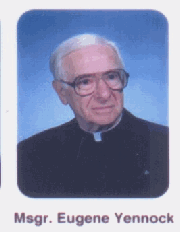Eucharistic Reflection - Are We Other Christs?
 |
| (Source: Wikemedia Commons) |
“The Divine
Lover in the tabernacle longs to diffuse His life. If we are to resemble Him,
then love, which is His life, must so burn within us as to set on fire the
world around us. "I am come to cast fire on the earth, and what will I but
that it be kindled?"' Christ wishes us to create or renew this life in
others.
To be His true
disciples, we must not possess our sacramental God selfishly, but, like Him,
we must willingly and generously sacrifice ourselves, be other Christs, in the
unrestrained, perfect development and diffusion of His life of love. As love acts
and reacts, our charity, especially toward those who need it most, through
daily, thoughtful kindness, through a delicate anticipation, and, if possible,
through relief of their wants - through spending ourselves and being spent for
them - will determine the extent of our love of Christ and His love of us. The
God of love cannot abide in a soul where there is no love of neighbor. "He
that abideth in charity, abideth in God, and God in him."
Rancor, discord,
arbitrary caustic remarks about peculiarities of our fellowmen, or dogmatic
judgment on their behavior, cannot coexist with the God who dwells in us only
through love. Divine charity cannot but languish in our hearts if we rudely
wound even the least of God's creatures. To appreciate the gravity of
uncharitableness, we have only to consider God's unwearied patience with us,
His meek tolerance of our sins, and the supreme gift of Himself when we return
to Him. He cannot, therefore, possess a soul contracted by distrust, embittered
by resentment, or poisoned by jealousy.
To receive Holy
Communion according to the mind of Christ is to lead a life lost in God.
"As the living Father hath sent me, and I live by the Father; so he that
eateth me, the same also shall live by me." When the presence of the sacramental
Savior within us crucifies our carnal selves and disengages our thoughts from
earth, we will bear with our brethren and give to our contact with them the
element that will mark our eternal communion with the saints. As, under the
guidance of the eucharistic King, he runs the way of God's commandments, the
communicant who fully corresponds with the grace of Holy Communion will so fuse
his earthly with his supernal state, that his body will be on earth, but his
soul in Heaven.
Christ suffered,
died, and gives Himself in the Blessed Sacrament, to transform the creature
and unite him to his God. Will such love find little or no response in our lives?
“
(From Transforming
Your Life – through the – Eucharist by Father John A. Kane)



Comments
This is such a beautiful gift and grace!